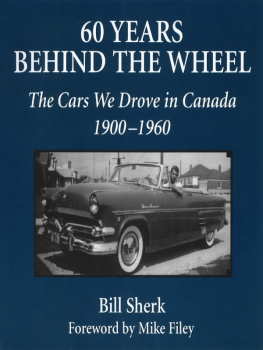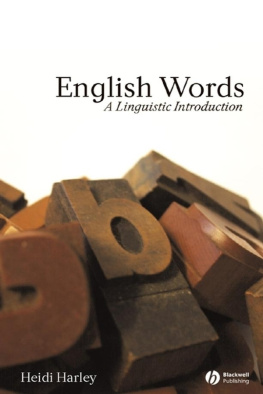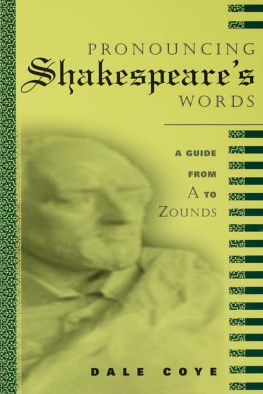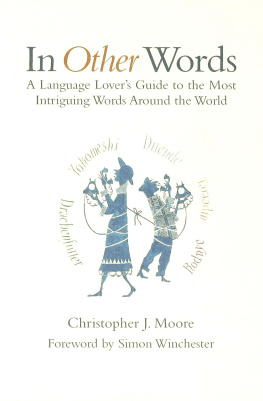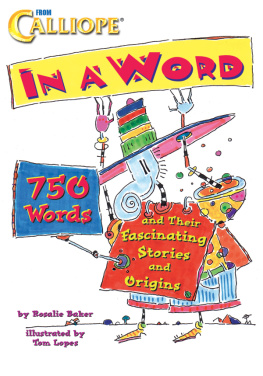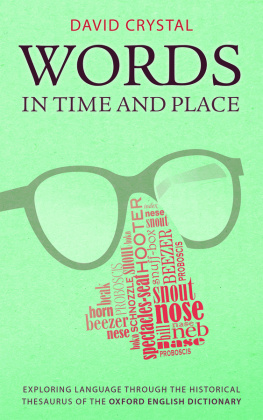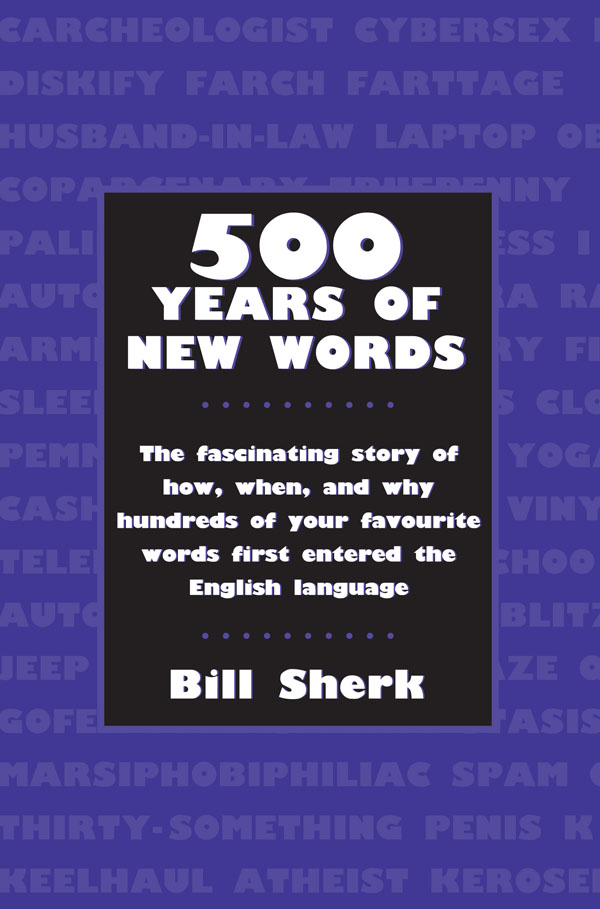500 YEARS OF NEW WORDS
To my two wonderful children,
Jeffrey and Juliana
500 YEARS OF NEW WORDS
BY BILL SHERK

Copyright Bill Sherk 2004
All rights reserved. No part of this publication may be reproduced, stored in a retrieval system, or transmitted in any form or by any means, electronic, mechanical, photocopying, recording, or otherwise (except for brief passages for purposes of review) without the prior permission of Dundurn Press. Permission to photocopy should be requested from Access Copyright.
Publisher: Anthony Hawke
Copy-Editor: Lloyd Davis
Design: Andrew Roberts
Printer: Transcontinental
Library and Archives Canada Cataloguing in Publication
Sherk, Bill, 1942
500 years of new words : the fascinating story of how, when, and why hundreds of your favourite words first entered the English language / Bill Sherk.
ISBN 1-55002-525-2
1. English language--Etymology. 2. English language--History.
I. Title. II. Title: Five hundred years of new words.
PE1574.S53 2004 422 C2004-905468-6
1 2 3 4 5 08 07 06 05 04

We acknowledge the support of the Canada Council for the Arts and the Ontario Arts Council for our publishing program. We also acknowledge the financial support of the Government of Canada through the Book Publishing Industry Development Program and The Association for the Export of Canadian Books, and the Government of Ontario through the Ontario Book Publishers Tax Credit program, and the Ontario Media Development Corporations Ontario Book Initiative.
Care has been taken to trace the ownership of copyright material used in this book. The author and the publisher welcome any information enabling them to rectify any references or credits in subsequent editions.
J. Kirk Howard, President
Printed and bound in Canada
Printed on recycled paper
www.dundurn.com
Dundurn Press
8 Market Street
Suite 200
Toronto, Ontario, Canada
M5E 1M6
Gazelle Book Services Limited
White Cross Mills
Hightown, Lancaster, England
LA1 4X5
Dundurn Press
2250 Military Road
Tonawanda, NY
U.S.A. 14150
500 YEARS OF NEW WORDS
TABLE OF CONTENTS
FOREWORD
by Dr. Frederick Sweet, Ph.D.
Bill Sherk and I share a mutual affliction. We are both incurable logophiles. In my case, this affliction carried me in the direction of what are generally known as the Dead Languages, Greek and Latin (I will grant that they are dead if others will grant that they remain remarkably vital). By contrast, Bill, a neighbour of mine in North Toronto, has discovered the rewards to be had in creating brand new words. If you havent yet read Bills splendid Brave New Words or its sequel More Brave New Words in which you will be exposed to such creative neologisms as accident-dent-dent-dent (a chain-reaction car crash) or parsipetrolambulist (a person who walks in order to conserve gasoline) you really should hunt up these volumes wherever they are to be found and settle back for a truly satisfying read. And while youre at it, try to find the books in which Bill indulges his second great love his long-standing passion for old cars: The Way We Drove: Torontos Love Affair with the Automobile, 18931957 and 60 Years Behind the Wheel: The Cars We Drove in Canada, 19001960.
In the present volume, which is a welcome update of an earlier edition, Bill has had the inspired idea of arranging new words chronologically over the past five centuries. He thus, in one swell foop, gives us both an insight into the origins of words and also an appreciation of the times that produced them. Never has history (Bills academic discipline) been so painless or so illuminating. Open this book and open your mind to a reading and learning experience that will leave you richly satisfied and greatly entertained.
The 1500s
By the year 1500, England was beginning to shake itself loose from the Middle Ages. For fifteen years the strong-willed Henry VII had been sitting on a throne he took by force from Richard III in the Battle of Bosworth Field (A horse! A horse! My kingdom for a horse!), and although old-timers still spoke of the Wars of the Roses, the English people were beginning to enjoy the blessings of peace, order and good government.
William Caxton had set up the first printing press on English soil in 1476, and a multitude of books poured forth from it, including the Bible. In 1497 Henry VII commissioned John Cabot to sail to the unknown lands across the Atlantic, and Cabot returned to tell about a newe founde land.
Meanwhile, around the royal court, Henrys four children two boys and two girls were growing up. By 1503 one son would be dead, but the other would survive to become the most famous and the most feared of all English kings Henry VIII.
By the year 1600, the people of England could look back on a century of turmoil, conflict, adventure and change. To obtain a divorce from his first wife, the strong-willed Henry VIII had broken all ties with the Roman Catholic Church and established a new Church of England with himself as Supreme Head. When Sir Thomas More refused to accept Henry as his spiritual leader, the king had his head chopped off (he also beheaded two of his six wives on a charge, real or fabricated, of adultery).
During the brief reign of Henrys son, Edward VI (15471553), England drifted toward the Protestant faith. During the equally brief reign of his sister, Queen Mary (15531558), three hundred Protestants were burned at the stake as Mary tried to re-establish the Roman Catholic Church in England. The country was heading for civil war.
In 1558 Princess Elizabeth became queen and calmed the troubled waters of religion with her new Anglican Church, a compromise solution that blended Catholic and Protestant faith and doctrine. A new English Bible and Book of Common Prayer gave the English people a heightened sense of pride in the majesty of their mother tongue, a majesty that reached full flower during the Elizabethan Age with Shakespeare, Marlowe, Ben Jonson, and the other poets and playwrights who drew their inspiration from the exciting times in which they lived. Francis Drake had returned home in 1580 from his thirty-five-month voyage around the world, a feat comparable to English-speaking astronauts landing on the moon in a future age of exploration. Eight years after Drakes epic voyage, English ships and guns (and favourable winds) helped to defeat the invincible Armada in the English Channel, a naval victory that paved the way for the growth of English sea power in the New World.
The forces and events that changed England and the English people during the sixteenth century are reflected in the English language itself. Thanks to the Renaissance of classical learning that began in Italy in the 1400s, a multitude of new words poured into English from Latin and Greek, including drama, sincere, peninsula, circus, satellite, democracy, stigma and catapult. Thanks to the religious struggles, words like scapegoat, papist and


